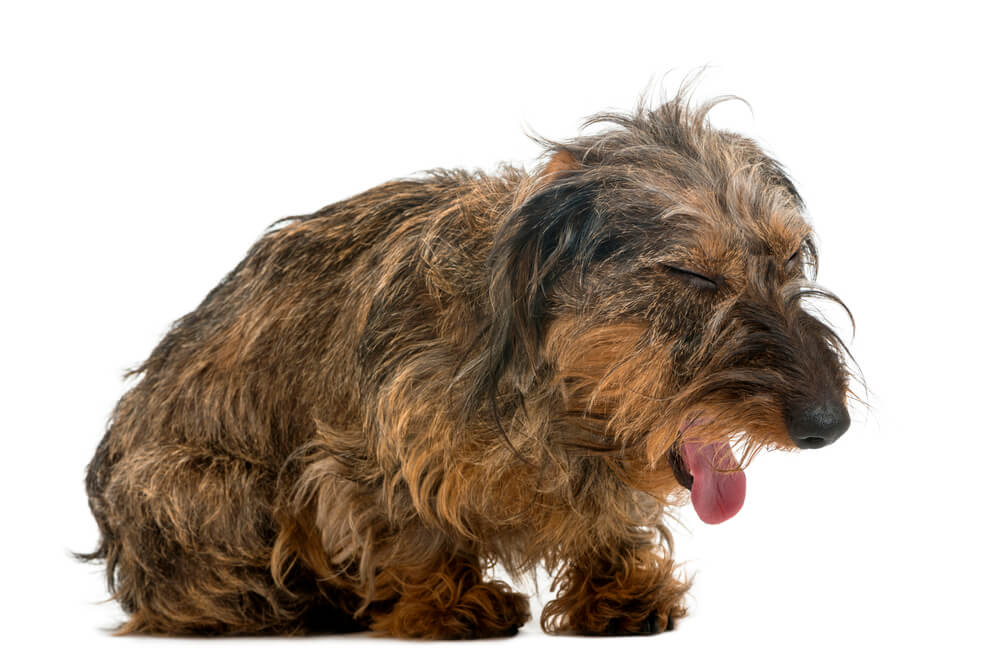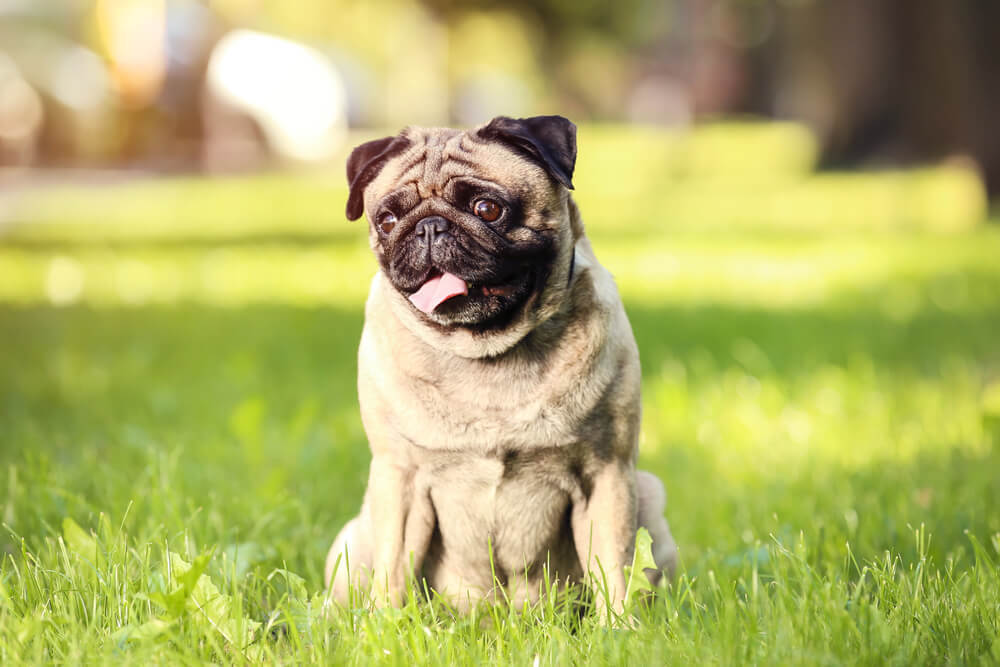Even if you have been around them for years, dogs can be puzzling creatures to look after on a daily basis. For example, what does it mean if your dog is gagging but does not throw up? After all, that is what you would expect!
The main question people want answered when asking these types of questions about what is known as ‘unproductive’ gagging is if there is cause for alarm or not. And as is the case when it comes to many dog behaviors, the answer is not a clear-cut one. While you should always pay attention if your dog is exhibiting strange behaviors like this, panic is not the answer.
Gagging and not throwing up can be a serious problem, or it may be mostly harmless. Whatever the case, pet parent panic can only make the situation worse. To help you better understand why your pup is gagging but not throwing up, and what you can do to help, we are going to take a closer look at the issue here.
Dog Gagging vs Retching vs Dry Heaving

All these terms may seem, on the surface, to mean the same thing, but the fact is that two of the three terms do indeed mean different things.
When your dog tries to vomit but nothing comes up, this is known as dry heaving. It will often look as though they are experiencing a whole-body spasm, beginning in the stomach and undulating out the throat.
Retching and dry heaving are essentially the same thing, simply two different terms for it.
Gagging, on the other hand, is exactly what it sounds like: your dog’s throat is spasming, making breathing and swallowing difficult for them. It has the same appearance and sound as if it were a human experiencing similar symptoms.
However, it’s not the same thing as choking.
Why is My Dog Dry Heaving/Retching?
While it sounds very serious, especially if you have not heard them do it before, dry heaving is not always serious, and while you should be vigilant, again, don’t panic, it may not be warranted, and you won’t help your pup at all.
Sometimes dogs retch because they feel nauseous. They may have eaten too fast, eaten too much, or spent a little too much time in the sun. This could be due to an underlying illness, but most of the time it’s just a passing thing that your pup will solve themselves if you let them.
If they have access to it, many dogs will eat grass to try to soothe their nausea. It may not be something you would personally do, but for them, it’s inherent behavior. While they can eat it easily enough, grass can be hard for them to vomit back up, leading to a retching sound after they have eaten it. In most cases this is harmless and any grass they’ve eaten will reappear in their poop later.
Some dogs will also retch if they are very hungry. This can obviously be solved by giving them something to eat, but you should make it something bland to avoid them eating too fast and making their distress even worse.
Dry heaving can occasionally be a sign of something more sinister. Allergies, parasite exposure, bloat, or having ingested a poisonous or irritating substance can cause dogs to retch. While all of them are undesirable, and scary to see, the last two are particularly dangerous and can even prove fatal if medical help is not sought quickly.
How to Stop a Dog Dry Heaving?
While the occasional dry heave in a pup is harmless, dry heaving on a regular basis is more concerning than actual vomiting. The act of vomiting expels whatever is causing the problem, whereas dry heaving does not.
This means that if your pup has ingested something they should not have, they are proving unable to solve the problem themselves and will need help right away.
Constant retching can in itself be a problem too. Multiple failed attempts to vomit up something bad can damage their stomach or throat, or can lead to something that had made it to the stomach to be brought back into the throat and become a potential choking hazard.
On the other hand this can make it easier to see what the problem is, so, without panic or sudden movements, you can try checking your dog’ mouth for an obvious foreign object.
While lots of other signs and symptoms may or may not accompany frequent retching, here are some of the more common ones that should be a cause for some concern and consulting your vet:
Why is My Dog Coughing and Gagging?
Seeing your dog gag can be very scary, as it is easy to think that they are choking and are in serious danger. Gagging is not choking though, and is usually caused by a laryngeal inflammation rather than an obstruction of their airway.
There are all kinds of relatively harmless reasons your pup may gag.
Exposure to smoke or other irritants, particles of food inhaled rather than eaten and more can all be reasons for relatively harmless gagging.
It can also, if it is frequent, be a sign of another more serious respiratory problem like kennel cough, which will warrant a visit to the vet as soon as possible.
How to Stop a Dog Gagging?
Again, the first thing not to do is panic. We’ve said that a lot here, but it really is essential. Banging your dog’s back, or grabbing at their head won’t help them and may cause more harm than the behavior itself.
As we also mentioned earlier, some gagging is no real cause for concern. If smoke from a cigarette, a fireplace or a bonfire is bothering them, move them away and the gagging will stop.
If they have inhaled food, and it is causing them to gag, it is often because they have eaten too quickly. If it’s something they do a lot, it can be a problem in itself, especially in dogs who are genetically predisposed to bloat, a dangerous twisting of the stomach that can quickly prove fatal.

In this case, speak to your vet about measures to slow your pup’s eating down, which may include more frequent mealtimes or the use of a slow feeder/puzzle bowl at mealtimes. If dogs are very hungry, they will often eat too quickly. Try to adapt their feeding schedule to their needs.
Some pups do fine being fed twice a day, but others will feel like they are being starved if made to wait too long between meals and will gobble their food down – and often retch after doing so, as a result.
In the case of other possible serious causes of gagging, guesswork is rarely a good idea. If there is any possibility your pup could have ingested something poisonous, they’ll need help as soon as possible.
Bear in mind that things that are not poisonous to humans can be so to dogs, including things like chocolate, onions, certain houseplants and common household cleaners.
As is the case for humans, one of the best things you can do immediately is call the ASPCA Animal Poison Control Center at (888) 426-4435. They are open 365 days a year, 24 hours a day and can provide immediate, expert advice right away (and the service is free).
If your pup gags often, you should discuss the issue with your vet.
Laryngeal paralysis is a condition that affects some dogs. This means that their larynx does not close completely in the way it should, allowing food and other debris to enter their airway and cause them to gag. While this condition can affect any dog, some breeds are more prone to this than others, including Golden Retrievers, Labradors, Great Danes and Bernese Mountain Dogs.
Sometimes gagging can, as we touched on earlier, be related to a highly contagious disease called kennel cough. It is often easy to spot when a cough is kennel cough though, as it sounds more like a goose honk than anything else. It is caused by highly infectious bacteria and gets its name from the fact that it is easily spread in boarding kennels and shelters where the space and ventilation is often not as good as it is in the standard home.
While not fatal if treated properly, kennel cough is very infectious, so if you suspect your pup may have been exposed try to isolate him from other canine (or feline) companions until he is seen by a vet.
Finally, if your dog is a member of a brachycephalic breed (brachy= shortened and cephalic= head), they are more prone to all kinds of respiratory infections, because of that short, stubby nose, and these may cause him to gag more often.

Brachycephalic breeds that typically have shortened skull bones with a smooshed face are; boxers, pugs, french and english bulldogs, shih tzus etc.
In general, the occasional gag, like dry heaving, is nothing to be concerned about. It’s your dog’s natural reaction to irritation, similar to how you cough or clear your throat.
If your dog appears to be in good health, and hasn’t had access to dangerous substances, it’s usually safe to just keep an eye on him for a few days. You’ll be fine if the gagging stops on its own, which it often will, especially if an environmental irritant was to blame. He should see a vet if it lasts longer than that.
My Dog Sounds Like He Has a Hairball. Should I Worry?
Hairballs are very common in cats. Cats, who are very fastidious creatures, wash themselves frequently, often several times a day. Hair is frequently swallowed as a result of this constant licking. The hair will occasionally form into a ball, which the cat will vomit back up. Hairballs are more common in long-haired cats, but they can occur in any breed.
Hairballs in dogs are far less common, simply because dogs just don’t do all that constant washing stuff that their feline counterparts do. They may attempt to wash themselves if they get very dirty, but other than that they really don’t bother. So, assuming that a dog has a hairball if he gags like your cat is often an assumption that is off the mark.
That being said, dogs can get hairballs. Allergies and skin infections may cause a pup to lick and bite his fur and skin, which may lead to him swallowing too much hair. Hairballs in dogs, while rarer, can also be more problematic than in cats. If a hairball is too large for your dog to throw up, it could cause a blockage in his digestive system. Surgery may be required in extreme cases. Hairballs can also cause dehydration because they prevent your dog from properly absorbing fluids. So, if you suspect your dog has a hairball, they should be seen by a vet right away.
You Might Also Like
Medical Disclaimer: If you are concerned about your pet, visit or call your veterinarian – he/she is your best resource to ensure the health and well-being of your dog. This information is for informational purposes only and is not intended to help assess or manage animal exposures or as a substitute for the professional advice of, or diagnosis or treatment by, your veterinarian with respect to your pet.


